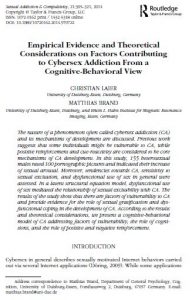Mental Health
Empirical Evidence and Theoretical Considerations on Factors Contributing to Cybersex Addiction
 Full Article Title: Empirical Evidence and Theoretical Considerations on Factors Contributing to Cybersex Addiction From a Cognitive-Behavioral View
Full Article Title: Empirical Evidence and Theoretical Considerations on Factors Contributing to Cybersex Addiction From a Cognitive-Behavioral View
Open Access: No
Abstract
The nature of a phenomenon often called cybersex addiction (CA) and its mechanisms of development are discussed. Previous work suggests that some individuals might be vulnerable to CA, while positive reinforcement and cue-reactivity are considered to be core mechanisms of CA development. In this study, 155 heterosexual males rated 100 pornographic pictures and indicated their increase of sexual arousal. Moreover, tendencies towards CA, sensitivity to sexual excitation, and dysfunctional use of sex in general were assessed. In a latent structural equation model, dysfunctional use of sex mediated the relationship of sexual excitability with CA. The results of the study show that there are factors of vulnerability to CA and provide evidence for the role of sexual gratification and dysfunctional coping in the development of CA. According to the results and theoretical considerations, we present a cognitive-behavioral model of CA addressing factors of vulnerability, the role of cognitions, and the role of positive and negative reinforcement.
Citation
Laier, C., & Brand, M. (2014). Empirical evidence and theoretical considerations on factors contributing to cybersex addiction from a cognitive-behavioral view. Sexual Addiction and Compulsivity, 21(4), 305–321. https://doi.org/10.1080/10720162.2014.970722
